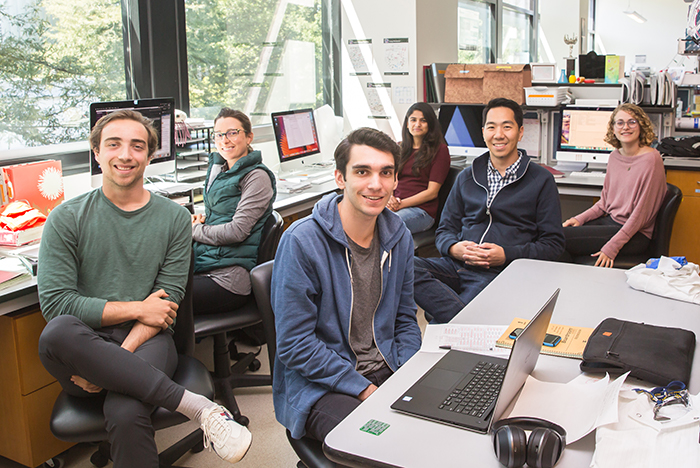Campus News
Gifts accelerate research, from the galactic to the microscopic
Gifts from Ken and Gloria Levy support biomedical discovery that may help cancer patients as well as research on dark matter halos, some of the universe’s largest structures



Kim and Xhakaj recently received critical assistance from two donors—Ken and Gloria Levy, a married couple—who are fans of education and early career scientists.
Gloria Levy, now retired, worked as a teacher and travel agency owner. Her husband, Ken Levy, started a company that supplies quality-control equipment to the semiconductor industry. As young adults, neither of them would have been able to afford college except that City University of New York and Brooklyn College were virtually free in the 1960s. Since finding success in their careers, they’ve supported education causes because of the meaning they have for them, and because they could afford to.
“We were both very thankful for the opportunities the education system gave to us,” Ken Levy says. “We were two humble kids. We did fine, and we think we need to give back.”
Gravitational lenses and the history of the universe
The Levys provided a fellowship for Xhakaj’s graduate work on dark matter halos—dark matter that envelopes galaxies.“Dark matter halos are crucial for understanding the history of the universe as well as the formation and evolution of the galaxies they host,” says Xhakaj (Ph.D. ‘22, astronomy).
Xhakaj estimates their boundaries and density by examining how their gravity changes the appearance of galaxies beyond them. Gravitational “lensing” makes more distant galaxies appear squashed into an arc, the way they’d look through the bottom of a wine glass.
Comparing the boundaries and density of the halos to a computer simulation —”I like to say I have the whole universe on my laptop,” she says—Xhakaj also estimates how fast the halos gather dark matter from their surroundings.
“The Levys’ passion for astronomy is wonderful,” Xhakaj says. “I wholeheartedly thank them for giving me this chance to live my dream every day.”
Once she completes her degree, Xhakaj hopes to continue her research and share astronomy with future students.
RNA: the “dark matter” of biology
The Levys have become enthusiastic attendees of the Kraw Lectures, UC Santa Cruz’s research showcase in Silicon Valley. At the April 3, 2018 lecture, Dr. Daniel Kim, assistant professor of biomolecular engineering, gave a talk on his lab’s investigation of a certain kind of RNA that might offer a way to diagnose cancer earlier.Kim refers to non-coding RNA as the “dark matter” of biology because, like the dark matter Xhakaj studies, it is little understood but may play a significant role in development and disease. Specifically, non-coding RNA is made from almost 80% of the 3 billion letters in our genome and dynamically changes in response to cancer-causing mutations in our DNA. From the RNA in a blood sample, Kim aims to discover non-coding RNAs that act as early warning signs of cancer in specific tissues.
Now they are working on technology they hope will help doctors detect this RNA signature of cancer in the blood, which would allow patients to receive treatment at earlier stages, when their cancers are more likely to be cured.
At the Kraw lecture, Kim mentioned to Ken Levy that one of the obstacles to his research is the amount of time he spends applying for federal and foundation grants. The Levys responded with a gift that enables Kim to focus on accelerating the development of his lab’s cancer early detection technology.
“There are currently no early detection methods for many cancers, such as pancreatic cancer” Kim says. “We are using the generous support of the Levys to rapidly translate our discoveries from the lab to the clinic.”
“It wasn’t his research that interested me as much as the fact he’s a young professor, he has big ideas, and he’s trying to perfect them,” Levy says. ”He’s bright. He’s intellectually curious, and he needed some support.”
The Levys’ gifts promise new discoveries in theoretical cosmology and RNA biology, but Ken Levy emphasizes their goal isn’t any specific outcome from Xhakaj’s research or Kim’s lab.
“For most of the funds spent looking for new frontiers, the research may not lead to anything,” Ken Levy says. “But some will make a breakthrough. You just don’t know who will do it. Eventually one will, but you have to fund it all.”